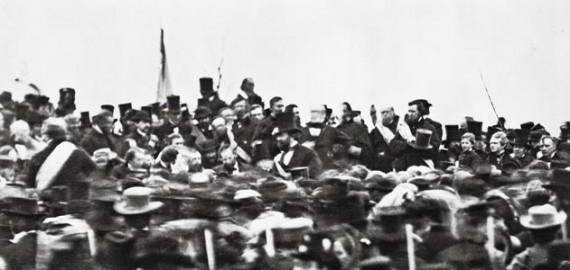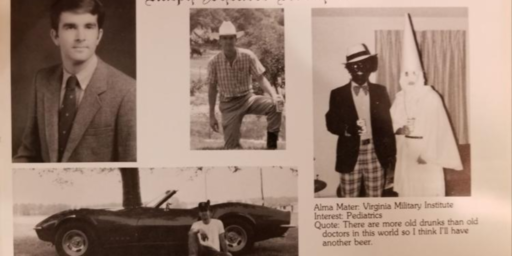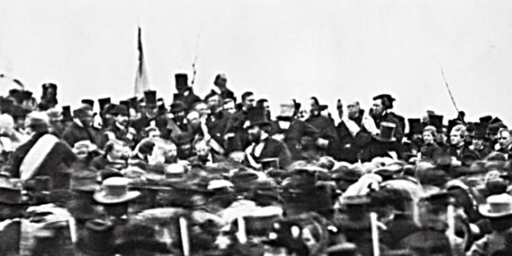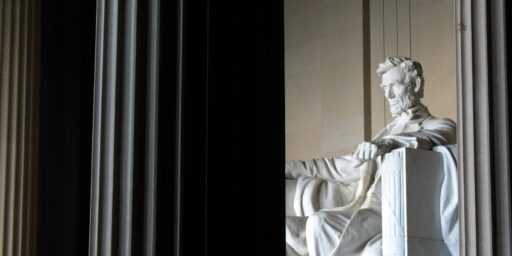After 150 Years, Pennsylvania Newspaper Retracts Editorial Panning Gettysburg Address
With the 150th Anniversary of one of the most famous speeches in American history just days away, a Pennsylvania newspaper has reconsidered its initial reaction to the President’s words that day:
(CNN) – In what might be one of the oldest corrections in the history of journalism, the editorial board of a Pennsylvania newspaper has retracted its predecessor’s famous panning of President Abraham Lincoln’s Gettysburg Address as “silly remarks.”
“Seven score and ten years ago, the forefathers of this media institution brought forth to its audience a judgment so flawed, so tainted by hubris, so lacking in the perspective history would bring, that it cannot remain unaddressed in our archives,” the editors of The Patriot-News wrote Thursday, evoking the opening words and style of Lincoln’s most famous speech.
Back then, the editors of the Patriot & Union newspaper — an ancestor of today’s Harrisburg paper — thought so little of Lincoln’s “silly remarks” that they hoped “the veil of oblivion shall be dropped over them, and that they shall be no more reposted or thought of.”
Oopsie.
History didn’t cooperate.
While mildly received on its delivery, the November 19, 1863, speech marking the consecration of the national cemetery at Gettysburg, Pennsylvania, has gone on to become one of the most famous pieces of writing in the American canon — inscribed on monuments, taught to schoolchildren and frequently surfacing in cultural references.
“Four score and seven years ago,” Lincoln wrote in the speech’s famous opening line, “our fathers brought forth on this continent a new nation, conceived in liberty, and dedicated to the proposition that all men are created equal.”
From the editorial retraction:
Seven score and ten years ago, the forefathers of this media institution brought forth to its audience a judgment so flawed, so tainted by hubris, so lacking in the perspective history would bring, that it cannot remain unaddressed in our archives.
We write today in reconsideration of “The Gettysburg Address,” delivered by then-President Abraham Lincoln in the midst of the greatest conflict seen on American soil. Our predecessors, perhaps under the influence of partisanship, or of strong drink, as was common in the profession at the time, called President Lincoln’s words “silly remarks,”deserving “a veil of oblivion,” apparently believing it an indifferent and altogether ordinary message, unremarkable in eloquence and uninspiring in its brevity.
In the fullness of time, we have come to a different conclusion. No mere utterance, then or now, could do justice to the soaring heights of language Mr. Lincoln reached that day. By today’s words alone, we cannot exalt, we cannot hallow, we cannot venerate this sacred text, for a grateful nation long ago came to view those words with reverence, without guidance from this chagrined member of the mainstream media.
The world will little note nor long remember our emendation of this institution’s record – but we must do as conscience demands
Nicely done, Patriot-News, nicely done.
Note: The photograph at the top of this post is the only known photograph of Lincoln at the Gettysburg battlefield on November 19, 1863. It was taken by the great Civil War era photographer Matthew Brady. While there is some disagreement among historians about which person in the photograph is Lincoln, if you look near the top center of the crowd in the photo, you’ll see a tall bearded man wearing a stovepipe hat that most seem to believe is the Sixteenth President of the United States.







Well, now that Lincoln is considered a Democrat, he gets an MSM pass.
@JKB: Wow, even this. There just isn’t a single thing in the world that you can’t twist into something to pity yourself over. You’re the right winger of the year!
I was going to drop in a little comment to the effect that Lincoln himself was less than satisfied with his iconic ‘Address’. But upon using the google to make sure, I encountered Dr Richard Norquist’s article ‘Facts and Myths About the Gettysburg Address’ and discovered this isn’t true. He was supposed to deliver short ‘remarks’. Also, two witnesses reported he wrote the speech well beforehand in Washington — and not on the back of an envelope.
Thanx for the opportunity to learn something new today.
I think the general consensus is that Lincoln is to the left of the man in the stovepipe hat and is looking down, I suspect probably reading the address. There has been some recent discussion about whether Lincoln has been identified in another photo from Gettysburg taken by Andrew Gardner, though there is some dispute about which person in he photo might be Lincoln. There was an article about it in USA Today back in September. http://www.usatoday.com/story/news/nation/2013/09/24/abraham-lincoln-gettysburg-address-smithsonian-photograph/2854811/
For some reason I’m reminded about the Vatican’s apology for burning Giordano Bruno at the stake, hundreds of years ago…..
“Oops, we got history wrong. How clumsy of us.”
There’s no sense in rushing into these things.
@Tillman:
Actually, it’s a little more than that.
This is a great reminder about how partisan journalism (i.e. Fox News) is actually a more historic and traditional form of American journalism than the idolized “Objective” journalism that came into fashion with the founding of Journalism Schools in the early twentieth century.
The Patriot & Union was an Anti-Lincoln paper. Hence the savaging of the speech. This was a very common practice at the time.
When the Gorbachev-era Soviet Supreme Court pardoned Nikolai Bukharin in 1988 his widow was still alive. I desperately wanted her to issue a statement saying, “This proves the system works!”
Not to mention to the left of many of today’s Republicans/conservatives…
@mattbernius: Point taken, but to me it doesn’t reduce the absurdity of retracting the editorial a century and a half later.
@mattbernius:
The local press didn’t escape R. Kipling’s epic panning Chicago. Spot on for the cable news of today.
http://www.online-literature.com/kipling/american-notes/5/